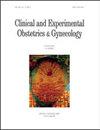高龄产妇对34周前早产儿新生儿结局的影响
IF 0.6
4区 医学
Q4 OBSTETRICS & GYNECOLOGY
引用次数: 0
摘要
背景:近年来高龄生育趋势明显。目前的大多数文献调查了高龄产妇与足月新生儿结局之间的关系。我们的目的是研究高龄产妇早产中母亲和新生儿的结局。方法:2009年至2017年的回顾性研究,纳入494例妊娠24 - 34周的单胎早产儿,其中116例(23%)为35岁及以上(高龄产妇),378例(77%)为年轻女性。回顾医疗记录,比较高龄产妇(≥35岁)和年轻产妇的母婴结局。结果:高龄产妇的严重脑室内出血(IVH)发生率和新生儿综合不良结局发生率均低于年轻产妇(p = 0.02和p = 0.05)。在多因素回归分析中,复合新生儿不良结局仅与高龄产妇存在独立负相关(调整优势比(aOR) 0.45, 95%可信区间(CI) 0.23-0.86)。结论:未发现高龄产妇是34周前早产儿不良新生儿结局的危险因素,可能是早期新生儿并发症的保护因素。本文章由计算机程序翻译,如有差异,请以英文原文为准。
The Impact of Advanced Maternal Age on Neonatal Outcome in Preterm Births before 34 Weeks
Background: In recent years a trend towards childbearing at older maternal age is evident. Most of the current literature investigated the association between advanced maternal age and neonatal outcome at term. We aimed to study the outcomes of the mother and the neonate among preterm births of women of advanced maternal age. Methods: This retrospective study between 2009 to 2017, comprised 494 singleton preterm births between 24 and 34 weeks gestation, of which 116 (23%) were of 35 years old or older (advanced maternal age) and 378 (77%) were of younger women. The medical records were reviewed and the outcomes of the mother and the neonate were compared between advanced maternal age (≥35 years) and younger women. Results: The rate of severe intra-ventricular hemorrhage (IVH) and of composite adverse neonatal outcome was lower among advanced maternal age women compared to younger women (p = 0.02 and p = 0.05 respectively). In multivariate regression analysis, composite adverse neonatal outcome was found to be independently inversely associated only with advanced maternal age (adjusted odds ratio (aOR) 0.45 95% confidence interval (CI) 0.23–0.86). Conclusions: Advanced maternal age was not found to be a risk factor for adverse neonatal outcome among preterm births before 34 weeks, and might be a protective factor from early neonatal complications.
求助全文
通过发布文献求助,成功后即可免费获取论文全文。
去求助
来源期刊
CiteScore
0.50
自引率
0.00%
发文量
241
审稿时长
1 months
期刊介绍:
CEOG is an international, peer-reviewed, open access journal. CEOG covers all aspects of Obstetrics and Gynecology, including obstetrics, prenatal diagnosis, maternal-fetal medicine, perinatology, general gynecology, gynecologic oncology, uro-gynecology, reproductive medicine, infertility, reproductive endocrinology, sexual medicine. All submissions of cutting-edge advances of medical research in the area of women''s health worldwide are encouraged.

 求助内容:
求助内容: 应助结果提醒方式:
应助结果提醒方式:


